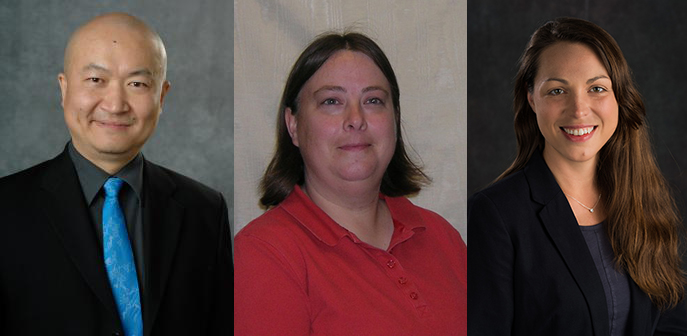Global Scholars Program

Building the Next Generation of Leaders in International Agriculture and Natural Resources
In January 2020, CANR launched “Global Scholars Program,” a unique effort to enhance engagement of early and mid-career faculty members in international programs. Through this endeavor, CANR leadership will annually select three or more global scholars to strengthen and expand their global linkages, networks and collaborative programs across three core missions of the college in diverse areas of research, education and outreach.
The fist cohort of three global scholars were selected in January 2020 and featured the following faculty:
Abigail Bennett, PhD, Department of Fisheries and Wildlife
Abigail Bennett’s international linkages and programs aim to increase knowledge and capacity related to the contributions of fish to livelihoods and food and nutrition security around the world. Africa and Latin America have served as focal regions in 2020, with plans to expand the geographical scope of the work to South Asia and Southeast Asia in 2021 and beyond.
Key collaborative projects include:
- S. Fish and Wildlife Service grant to work with fishing communities to combat sea cucumber poaching and trafficking in Mexico.
- USAID funded grant to study the potential of the black soldier fly as aquaculture feed in Nigeria.
- Large-scale spatial fish value chain mapping study in Malawi.
All of these collaborative projects involve partnerships with local academic and research institutions and participation of government, community organizations and private industry. These international activities are situated within broader partnership-building efforts at the international scale, with linkages to MSU’s MoUs with the UN-FAO and CGIAR World Fish Center. In April 2020, a virtual workshop with nearly 60 participants from institutions from 12 countries in Asia, Africa and Latin America discussed what makes multi-institutional partnerships successful in supporting and enhancing the contributions of fish to livelihoods and food and nutrition security.
Lisa Tiemann, PhD, Department of Plant, Soil and Microbial Sciences
Lisa Tiemann works to promote soil health as a critical component for building sustainable agricultural systems that are resilient in the face of climate change and provide the suite of services crucial for human food security. Tiemann has united a team of researchers at MSU and Egerton University in Kenya to address research related to soil health in Kenya. This team has submitted a proposal to the U.S. NSF-DISES program.
Tiemann also currently co-leads the SAIRET (Sustainable Agricultural Intensification and Rural Economic Transformation) group that is comprised of a multi-disciplinary group of African and U.S. scholars, supported by the Alliance for African Partnerships (AAP) and the African Development Bank (AfDB). The SAIRET group coordinated special panel discussion events at the 2020 African Green Revolution Forum (AGRF) Summit and at the 2020 World Food Prize Borlaug virtual dialogues. This group, working with the African Development Bank, has been invited by the African Union (AU) Department of Rural Economy and Agriculture to provide research and technical reports in advance of the Africa Fertilizer Summit II.
Wei Liao, PhD, Department of Biosystems, and Agricultural Engineering
The international activities of Wei Liao, PhD, in 2020 spanned across three continents – South America, Asia and Africa. He is serving as chair of the executive committee to organize the 3rd American Society of Agricultural and Biological Engineers (ASABE) global engagement conference – Sustainable Energy for a Sustainable Future that will be held in Costa Rica in 2022.
He is a member of a team to develop solutions of utilizing agricultural residues for value-added applications in Central America.
In Asia, Liao is engaged in two on-going projects in Kazakhstan and India focusing on capacity building and advanced bioenergy research. He also led a multi-national, cross-disciplinary team and developed a USAID BRIDGE-U proposal for the development of sustainable rural communities in the Hindu Kush Himalayan region. A partnership between Egerton University, Nanjing Agricultural University, University of Costa Rica and MSU from three continents has been established to develop a collaborative program focusing on community-based environmental and energy solutions.



 Print
Print Email
Email